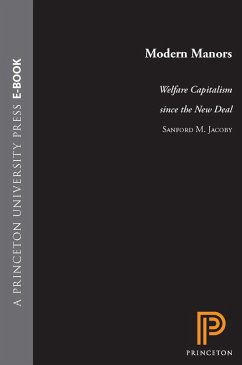In light of recent trends of corporate downsizing and debates over corporate responsibility, Sanford Jacoby offers a timely, comprehensive history of twentieth-century welfare capitalism, that is, the history of nonunion corporations that looked after the economic security of employees. Building on three fascinating case studies of "modern manors" (Eastman Kodak, Sears, and TRW), Jacoby argues that welfare capitalism did not expire during the Depression, as traditionally thought. Rather it adapted to the challenges of the 1930s and became a powerful, though overlooked, factor in the history of the welfare state, the labor movement, and the corporation. "Fringe" benefits, new forms of employee participation, and sophisticated anti-union policies are just some of the outgrowths of welfare capitalism that provided a model for contemporary employers seeking to create productive nonunion workplaces.
Although employer paternalism has faltered in recent years, many Americans still look to corporations, rather than to unions or government, to meet their needs. Jacoby explains why there remains widespread support for the notion that corporations should be the keystone of economic security in American society and offers a perspective on recent business trends. Based on extensive research, Modern Manors greatly advances the study of corporate and union power in the twentieth century.
Although employer paternalism has faltered in recent years, many Americans still look to corporations, rather than to unions or government, to meet their needs. Jacoby explains why there remains widespread support for the notion that corporations should be the keystone of economic security in American society and offers a perspective on recent business trends. Based on extensive research, Modern Manors greatly advances the study of corporate and union power in the twentieth century.









